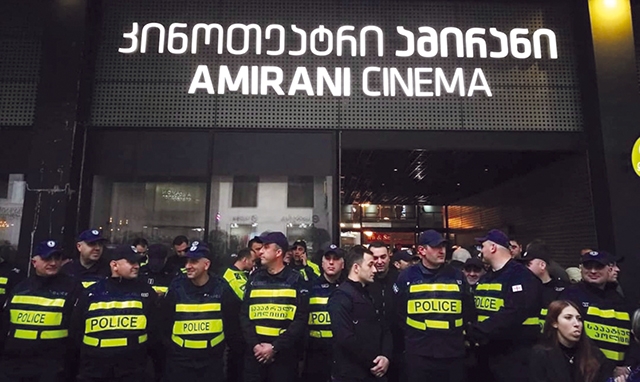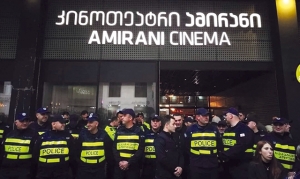And Then The Homophobes Protested…
And Then We Danced is a now renowned award-winning, critically acclaimed Swedish-Georgian film. But that description failed to impress some Georgian ultra-right-wing groups. For them, it is a movie that is robbing Georgia of “its national identity” (though they have yet to really explain what this “Georgian identity” is).
‘And Then We Danced’ raised much speculation among these groups, given that it is a gay-themed movie, featuring Georgian dance and many other beloved elements that carry something of what makes up the ‘Georgian identity’. So when it was announced that the Swedish-Georgian queer love story would be screened in Georgia, the homophobic forces reacted immediately.
On November 8, the first day of the movie screening, Sandro Bregadze, the leader of ultra-conservative movement Georgian March, announced that he, along with his supporters, would hold a rally against the premiere of ‘And Then We Danced,’ in front of the Amirani movie theater in Tbilisi center. He underlined that the demonstration would be peaceful and the protestors would not use force to disrupt the screening, nor would they try to enter the movie theater.
It was not too long after this promise that the protestors burnt an LGBTQ+ flag in front of Tbilisi Concert Hall near Amirani. The MIA answered press regarding the move saying that the Georgian Criminal Code has no law against such an act. Indeed, throughout this and other demonstrations, the police held to the law and did everything in their power to keep the situation peaceful. Law enforcers, fire and emergency brigades were constantly mobilized in each cinema location.
As the film’s start time approached, the number of protestors rose. The Georgian Marchers were joined by Levan Vasadze, a Georgian businessman known for his ultra-right-wing mentality and homophobic aggressiveness, and his supporters. Vasadze and his supporters held a separate rally in Vera Park, from where he addressed Ivanishvili, asking him to come join the demonstrations.
“I want to address Bidzina [Ivanishvili]: if you are really scared of canceling this film, then come here and stand with us in Vera Park. Show your national position that way. Bring your Prime Minister along, and Garibashvili; let us see your Minister of Defense… Let us know that you are not ignoring the public outrage,” said the homophobic businessman.
When the two groups of protestors united, the situation grew in intensity at Amirani. They began shouting "shame" and "Georgia", demanding the cancellation of the movie screenings. Some members of the Church also joined the homophobic groups to protest. One of their banners read "Those who screen the movie and those who watch it - they are all swearing at Jesus Christ". Other protestors held up Christian Orthodox icons, some of them even read prayers aloud, while still others lit fireworks or threw bottles and other items.
The ultra-right-wing protestors at one point tried to force their way into the Amirani movie theater. The police kept them from entering but the rally members refused to back down. Two of them managed to slip inside the doors but were quickly detained and were reportedly arrested for disrupting public order.
At first, it was hard for those coming to see the movie to enter the building, however, the police stood in cordons to help the cause.
During the first day of the movie screening, the one most physically hurt was social activist Ana Subeliani. A heavy object was thrown and hit her forehead. The emergency unit provided immediate medical assistance and took her to hospital.
Subeliani told the media that the homophobic protestors had deliberately attacked her, knowing who she was. “They recognized me and started threatening me. The police did nothing to stop them, though everything signaled that I would be victim to physical attack,” she said. The social activist claimed that it is a by “mere chance” that she didn’t lose an eye.
At the end of the long day and night of the ‘And Then We Danced’ premiere in Tbilisi, the Ministry of Internal Affairs announced that 27 people had been detained, 24 of them in Tbilisi and three in Batumi. The irony of these protests lay in the fact that while the homophobic rallies were warming up in Georgia, ‘And Then We Danced’ was winning yet another international award - Listapad, an international film festival in Minsk, awarded lead actor Levan Gelbakhiani ‘Best Actor’ for his portrayal of Merab.
On Saturday and Sunday, the homophobic groups felt the need to protest the second and third movie screenings. However, both in Batumi and Tbilisi, these screenings took place in a much calmer environment. On November 9, one person was detained in Batumi. The Ministry of Internal Affairs reported that the demonstrator verbally insulted the moviegoers for attending such a ‘sinful’ movie.
Despite the dramatic protests of the homophobic groups, all the planned movie screenings of ‘And Then We Danced’ in Tbilisi and Batumi on November 8, 9, and 10 were not disrupted and all who actually went to see the film, rather than losing their 'Georgian identity', gained a better sense of it.
By Nini Dakhundaridze
Image source: Radio Tavisupleba












